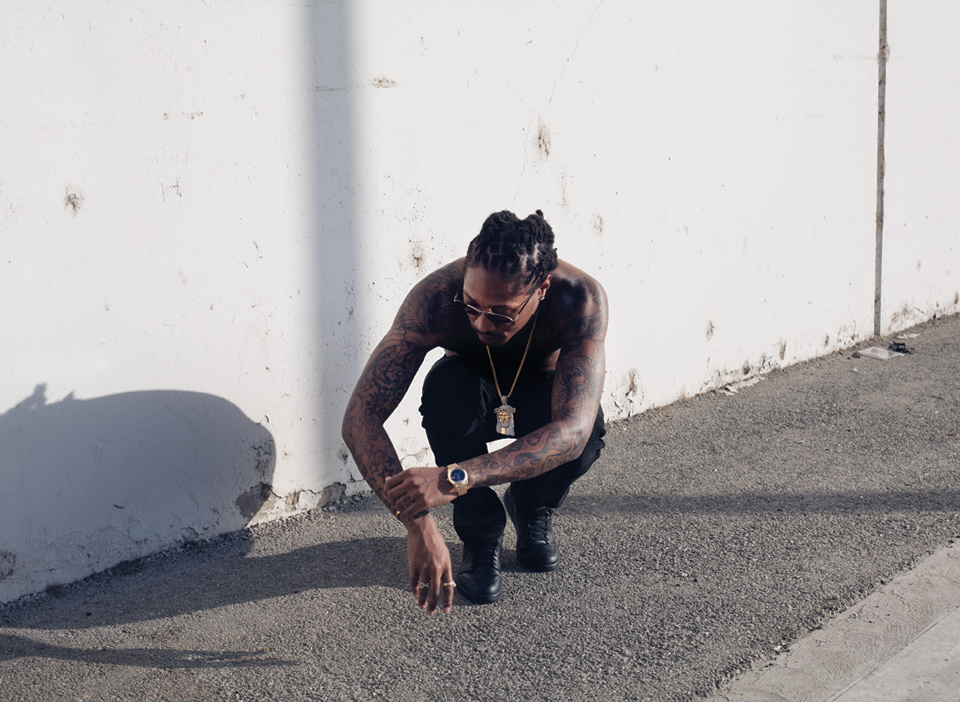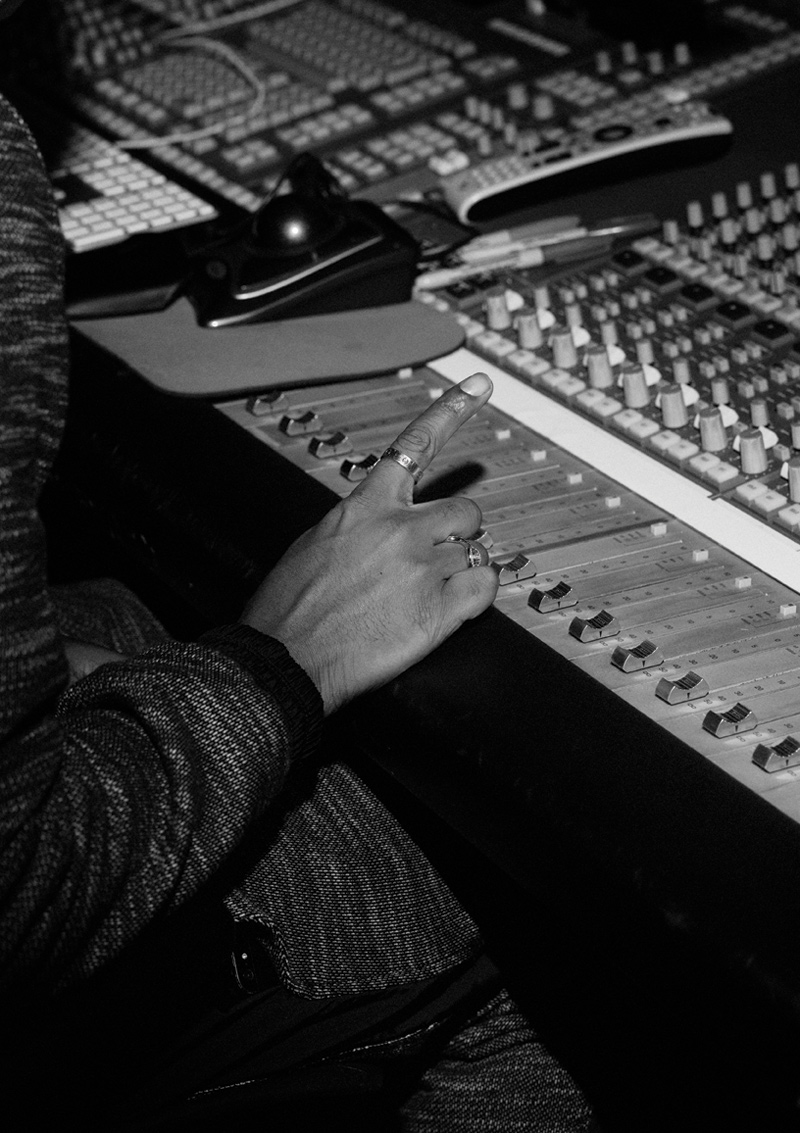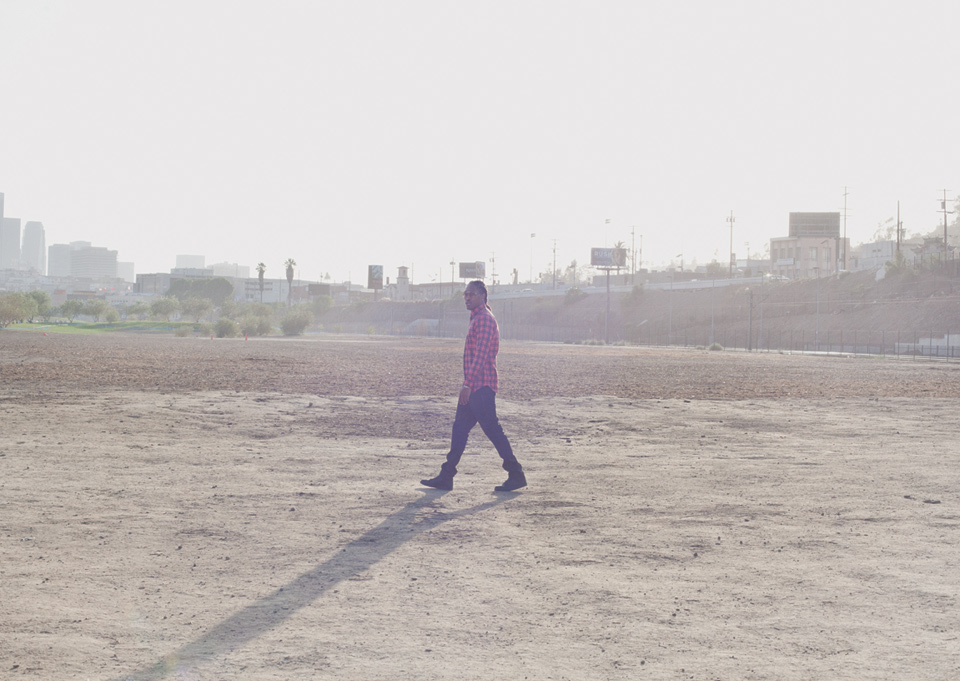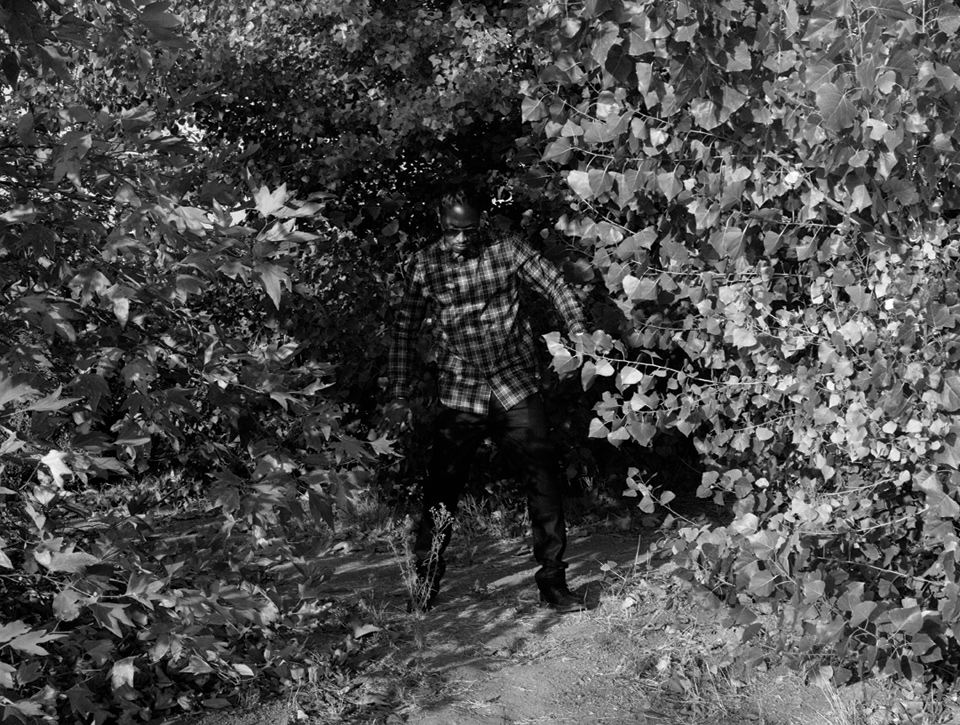After finding himself in the studio, Future starts letting people in
From the magazine: ISSUE 89, December 2013/January 2014
Sitting at a laptop, with his back to me and a handful of label and press reps at New York’s Jungle Studios in October, Future thumbs through folders of ProTools files, grinning. “I have over 1,000 songs. Tweet that!” He queues up unreleased singles and pulls from a blunt, apparently disinterested in a side conversation between his publicist and a label staffer about Grand Theft Auto V. Minutes later, after the thread’s been dropped, he snaps around in his chair to say, “I don’t think I wanna play a video game you can take selfies in.”
Future’s on his own planet, participating in this one on his own terms. He spent much of his early career on self-imposed studio lockdown, a lab rat reveling in the elasticity of his own voice and the hooks that popped up in his head. He emerged nationally in 2011 with songs that layered the bruising drums of contemporary rap radio with sticky, nursery rhyme melodies. On “Racks,” he digitally purred a jubilant chorus; for “Tony Montana,” he speed-bleated croaky raps in a strange approximation of a Cuban accent, sounding unlike basically any rapper before him. For that distinction, two years ago, we put him on the cover of FADER’s Now Issue.
On his 2012 debut LP, Pluto, Future proved himself a master of two forms: the screaming street hit—often with choruses built from one repeated phrase, more meaningful as sound than lyrics—and sentimental ballads framed as rap songs. Future draws power from vulnerability, and he’s made a virtue of his strangled singing voice, pushing through every hook with a single-minded optimism. Many have rapped about the perils of a street hustler’s lifestyle, but Future embeds sing-alongs into those stories, allowing anyone to share in the joy of his self-empowerment and release. That relatability has made him a mainstream rap star. These days he has a famous fiancée, the R&B singer Ciara, and splits time between his hometown of Atlanta and a new house in LA. To travel between them, he’s arranged permission to be dropped off right on the runway at Atlanta’s Hartsfield Jackson airport so he can board commercial flights alone, in peace.

With his new album, Honest, Future is as hard to imitate as ever, though other artists have been trying, parroting the clipped exclamations and narcotized moans that elevated Future’s status to that of a crucial, visionary component of rap’s landscape. This winter, he was invited to tour arenas with Drake—currently rap’s biggest pop-crossover star—but Future told a reporter that his music was more emotionally impactful than Drake’s, and, days before the first show, Drake threatened to kick him off the tour. (After some back-and-forth, the shows went on as planned.) Ahead of that snag, at the offices of his label, Epic, in October, he wears a gray designer trench coat and chooses grilled chicken and snap peas for lunch, joking with a rep that you add more zeroes to your checks when you take your shirt off onstage. Here, he opens up about the younger artists nipping at his heels, living with Ciara and balancing love with his big ambitions.
In your 2011 FADER cover story, you said you wanted your fans to grow with you musically. Where will Honest take them that Pluto did not? Honest is more personal than Pluto. The album is about being honest while also establishing myself as a hitmaker. The songs are more emotional; I’m helping my fans understand more about me. I want the audience to reach me. I want them to open up to me and understand that I’m the best to do it. Music-wise, nobody is as creative as me. I was born to make music; there’s just melodies in my soul. When I’m asleep, I’m thinking of a hook, I’m thinking of a new way to approach the track.

Sonically, is the album a departure from your earlier work? I didn’t take a left turn for the album musically. I just used all my energy and found a way to zone out through even the bad times and turn every negative into a positive. I try to turn every situation into a moment. My approach to recording is pretty much the same: I create raw material from the space around me, whatever environment I’m in. Now, I’m critiquing that raw material more; I like to go back in and change a few things. But your imperfections are what make you perfect, so I try not to change anything too much.
“I don’t really let people in to my world. You’ve gotta save something for yourself. You can’t just let everybody know everything about you.”
Then how do you push your sound forward? Every record that I do, I try to reinvent myself. A different day calls for a different style. I record between three to seven songs in a day, and I don’t do the same style over every beat. I try to step outside of the box, add on different elements that weren’t there before. At the end of the day, four of those songs may sound alike, but three of those songs come out with something different. I take risks, because with great risks come great rewards. My music’s further away from rap now than it’s ever been, but rap is my home. I’m comfortable in my own skin and I’m comfortable with doing the music that I’m doing.
Is writing for other people, like Lil Wayne and Rihanna, different from working on your own? You try to bring the best out of everyone. I’m more of a show-and-prove guy. I can show you better than I can tell you how to do something. I don’t like to plan anything; I don’t wanna put that pressure on myself, working with someone who expects me to give them a hit as soon as we go to the studio. Collaborations have to come to me natural.
Everyone has to work around your flow? Yeah. Sometimes it might frustrate you. I have to go off the moments and the vibes of people. That’s what makes me open up more. I observe everything. I observe the way you might look, the certain tone on your voice. If you pay attention to everything, you can read people. That’s the way you stay ahead.
Can people tell that you’re paying attention? Nah. I always have on glasses, so people don’t know if I’m looking or not.
Up to this point, you’ve essentially been the sole character in your songs. But there’s a solid, recurring female character all over Honest. Is that a result of your relationship with Ciara? We get along; she understands me. We fit each other. I feel like we were destined to be together, and it happened. I wasn’t hurrying up and rushing toward something. I took my time and love came to me. We’re both Scorpios—Scorpios over-love. So we’re just loving each other as hard as possible. I had great relationships before this one. But it’s hard to find somebody you just wanna wake up to every day. Finding someone you really get along with—you wouldn’t even imagine it could be that hard, but it is.

Has being in a relationship changed your demeanor? I wouldn’t say I’m happier this year than last year, because on some days, you still feel like you’re missing out, you feel like you could be doing more. I’m focused on my rap career, so I really don’t focus on other things that are not pertaining to music. I’m in the zone right now. I can’t entirely focus on anybody but Future.
Has Ciara nudged you away from your studio rat lifestyle? Before, I wasn’t stopping to eat dinner. I never ate at a restaurant for like, two or three years. She’s not really taking me out of my zone, but the relationship has opened me up to more and given me more to talk about. When you go to sleep with somebody and wake up with them, there’s certain stuff that she’s gonna have to know about that other people aren’t gonna know about. That’s what we share, and what we’re building our foundation around—those things that we know about each other that nobody knows. We really are best friends.
You bought a home in LA, but it seems you try to avoid the normal trappings of celebrity life. It’s a chill mode in LA. I get a chance to take my time and pace myself there. I just eat good every day, get those nice meals. I’m sleeping more. I cut back on the weed a little bit, and I cut back on a lot of other things a whole lot. I don’t drink lean at all anymore. I need my energy right now. I need to be up. Generally, I don’t try and do too much extra. If something doesn’t fit me, if it’s out of my character, then I won’t do it. I won’t sacrifice my image or sacrifice the person that I am just for a picture or a red carpet event. I don’t really let people into my world. You’ve gotta save something for yourself. You can’t just let everybody know everything about you.

Is singing in a way that obscures your lyrics a way of not letting people in? Do you care if people understand what you’re saying? You can’t figure out great music the first time around. It’s not that simple: you have to play it over and over before you really hear it and get the message. I try to make timeless music that you can go back to ten years from now and find something new in. Songs like “Truth Gonna Hurt You,” from Pluto, or “Stand” and “I Think They on 2 Us,” from Dirty Sprite—I don’t think people really understand those. I didn’t want my fans to feel like they knew everything about me. Over time, I have gotten more comfortable with sharing my story. I believe more is expected of me right now. I’m living my life in the forefront and the audience is getting bigger, so there’s more to talk about.
Recently, you seem to want to talk about sex. Because people love sex. It’s a stress-reliever. I don’t wanna be stressed. I let stuff affect me more in the past and now I don’t pay attention to it. Everything I went through in the streets was preparing me for the music industry. When someone has something negative to say, it doesn’t affect me, because I already went through something much worse.
On Honest, you duet with Miley Cyrus and spotlight a verse from Nicki Minaj. Why’d you seek them out? I’d rather work with women than men. I love women. I respect women. It’s just easier to get along with them. When you’re working with a man, there’s more ego, and you gotta showcase a certain attitude. With a woman, you can be more vulnerable. When you get to a vulnerable place, that’s when the good music happens.
“I call those people that bite off of somebody else’s style swagger snackers. I’m the one that prepares the meal.”
There is talk that Big Boi and André 3000, who also raps on Honest, may be working on new OutKast music. Your cousin, producer Rico Wade, used you as a gauge for what kids liked when you rapped in Dungeon Family group Da Connect. Will OutKast look to you for guidance on what the Dungeon Family sound can be like in 2014? If the album happens, it happens. André 3000 has been a major influence on the way I think about music. He’s very artistic and I love that about him. More than doing a record with him [for Honest], it was great to have him just listen to my album. He thinks my music is great. He really loves it. I don’t think he’s looking to me for any advice—OutKast know how to do it. I’m most definitely part of the mix, but I’m my own thing. I’m international, I stand out. I’m a standout guy, not regular. If you go right, I’m gonna go left. If you go left, I’m gonna go right. I’m a weirdo. Look at my coat! You don’t see no normal street dude who used to stand on the corner every day and hustle wear a trench coat.
Some of your signature vocal techniques now pop up all over rap and pop radio. Are you happy to see the ways you’ve mutated rap become mainstream? How do you respond to copycats? I’m glad to see my music spreading out into other people’s music: they’re making me bigger and pushing me toward the forefront. I’m like the forefather of a new sound. If somebody else is doing what I’ve been doing, it shows that my work speaks for itself. The truth always finds a way to come out. But you don’t ever get full off a snack. I call those people that bite off of somebody else’s style swagger snackers. I’m the one that prepares the meal. I’m my own competition. I’m competing with myself right now.
